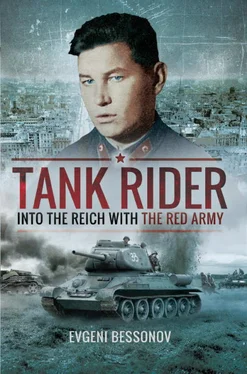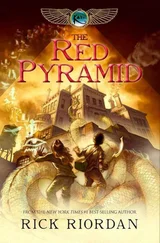While I was thinking what to do, our ground attack planes flew in, Il-2 Shturmoviks, approximately twelve or fifteen planes. They first dropped their bombs and then started to plough up the enemy’s defences with missiles and fire from their guns and machine-guns. The assault gun disappeared from our sight, the enemy ceased fire, and under cover of the air attack I got the company up. We rushed forward as fast as we could, while we still had energy and while the enemy was depressed, and we tried to reach the top of the hill as quickly as possible. After we reached to top of the hill, the Shturmoviks ceased their attacks, assumed formation, waved their wings to us and flew away. I was very happy, it was for the first time that I saw such a successful cooperation of infantry and air force. I wish we had had it all the time! We also waved our hands to the pilots, shouting ‘Hurrah!’, thanking them for assistance. Apparently, it was the Brigade staff that organized the air support, as the hill was of great significance.
We found trenches, a well, several houses and barns on the hill. On the rear slope of the hill there was a steep descent into a deep hollow with a village; one could see a dozen huts and barns there. The Fritzes fled to the left of us, into a wood, evading the hollow. As we passed the German trenches I was starting to decide in which direction the attack should be continued – into the hollow or towards the grove, where the Germans fled – when a mass of large-calibre shells dropped on us.
Debris from barns, huts, the well, the shells, all flew into the air. The fire was heavy, explosions were going off all around us, and for a moment I was lost, thinking that that was the end for me and my soldiers. Some of my soldiers ducked by the destroyed huts and the well, others threw themselves towards the wood, as there were no explosions there, some ran down the slope. I ran away, stopped at a place where shells were not exploding and started to stop and gather soldiers around me; squad leaders assisted me in that. We ran along the ridge of that hill, stopped at the grove edge, lay down and started to dig in. The Germans were out of sight. The artillery strike that caught us by surprise suddenly stopped, apparently the Fritzes were saving ammo or thought that the job was done. They would often do that – deliver a short artillery strike on a concentration of infantry and then have a break. It was interesting that we did not suffer heavy losses from that artillery strike, just a few soldiers were wounded, but I found out that two soldiers were missing, they were greens, apparently, and they had run away when we were attacking the hill. I had noticed before that they always stayed by themselves, did not contact the old pals, only talked to each other. I had told the squad leader and the assistant platoon leader to keep an eye on those two, but they had other things to do in the attack, and the two soldiers ran away. To hell with them, they could not run far – and the river bridgehead was not that big. If those two had deserted, they would have been caught.
Company commander Senior Lieutenant Chernyshov arrived and gave us another order – to advance right through the wood, where the Fritzes had fled from the hill. When we deployed in a line and started our advance through the wood, the 2nd company of our battalion arrived; it had orders to advance on the right of our company. It cheered us up, as we were to advance with reinforcements, not alone. In general, attacking in a wood is different from other types of combat, say in open terrain or in built-up areas. You can’t see the enemy – there are trees, bushes and high grass all around; you don’t know what is going on with your neighbour. I rarely fought in such terrain. The Germans rarely set up defences in forests, and as a rule did not launch attacks in forests.
We walked for some time among the trees without any shooting. Company commander Nikolai Chernyshov was next to me, this was quite rare – apparently, the battalion commander had scolded him and he decided to lead the company himself. We all knew that Germans were dug in somewhere in the area, but still, the heavy machine-gun fire that they opened on us was sudden. As the enemy was close, the bullets did not whistle but flew as a dense swarm. When they hit a tree they made a sound, as if someone hit a tree with an axe, the sound was loud and juicy, one could hear that it was a strong impact. We had to lie down. We somehow dug in and started to look around, but because the young forest was dense we could see nothing, although we knew that the Fritzes were somewhere next to us. Company commander Chernyshov was shouting: ‘Bessonov, forward! Get the soldiers up and attack!’
I had to fulfil the order and shouted (because of the exchange of fire we could barely hear each other) to my assistant platoon leader and Sergeant Savkin: ‘Get the men up and attack!’ They were lying on the ground and looking back at me, as if they were saying, ‘Why don’t you get up yourself? Get them up yourself!’ And they were right – that was my job.
Ah, whatever! During a pause between two machine-gun bursts I drew myself up to my full height and shouted at the top of my lungs: ‘Get up, get up, you this and that! Follow me, charge, forward!’ A short and clear message – the situation called for it. Savkin and my deputy platoon commander (I forgot his name) jumped up from the ground at the same time as me and the whole company followed. We ran the distance to the German trenches, but they did not like hand-to-hand fighting and fled. We did not pursue them – they fled and to hell with them. We stopped in their trenches to have a break and decide what to do next. In principle, we had completed the mission, but German tank engines could be heard in front of us. The German tank engines had a special sound – a mournful one, different from our tank engines. It was hard to say how many tanks there were just from the sound.
Chernyshov walked up to me, sat down under a tree and we discussed the situation and further action. Chernyshov reported the situation to the battalion commander over the field ’phone and received an order to wait for the tanks to arrive. At that moment the Fritzes opened artillery fire, most likely from tank guns, and shells exploded, both short and over us. They did not know the company’s position and fired at random.
A shell hit the tree, beneath which Chernyshov and I were sitting; splinters wounded several men, including me. Chernyshov was not hit. All this happened in a twinkle of an eye – I did not even manage to realize that I was wounded and did not lie down on the ground – but something just bent me. I quickly ran away from the spot, shouted to Chernyshov that I was wounded and quickly – running and walking – went to the battalion’s aid post. They bandaged me in haste, and I went to the Brigade’s medical and sanitary platoon. It turned out that I was wounded in the right side of my chest, both shoulders and the left foot. They disinfected my wounds in the medical platoon and bandaged them. I was hoping that I would be sent to a hospital, but my dreams did not materialize. I did not want to stay in the medical platoon and went back to the battalion. I reported to the battalion commander and received permission to stay at the aid post. A couple of times I had to go to the medical platoon to change the bandages, the wounds healed, but the movements of my right hand were still limited, the wound was sore, the pain echoed in my chest (these splinters are still both in my shoulders and in my chest).
For about a week I hung around the kitchen (it had finally arrived and started to provide food to battalion’s men), until the battalion was transferred to another sector, where the situation became difficult. In my absence the platoon was led by my assistant platoon leader, a Jewish Senior Sergeant, whose last name I totally forget. He arrived in my platoon in June 1944 from an army unit. A brave and steady NCO, he was a good assistant to me. He proved himself a good soldier in action in Lvov. Soldiers of my platoon and even the company, especially the old hands, took to him straight away for his calm character, bravery and smartness in battle. He deserved to be reckoned with. It was a pity that soon after I was wounded he was killed, mortally wounded by a shell splinter in his chest. He was just 22 years old.
Читать дальше












